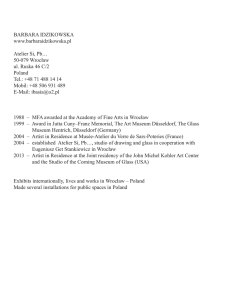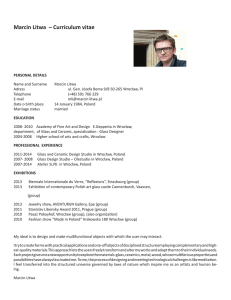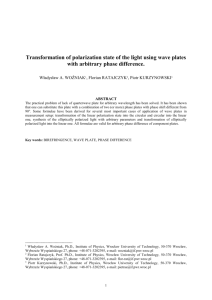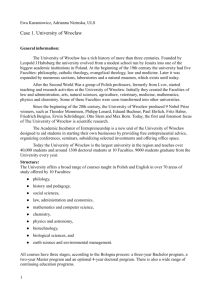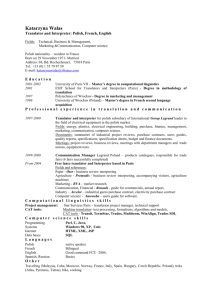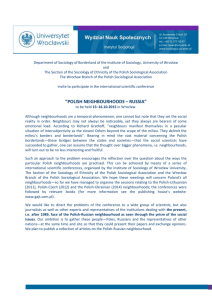Slajd 1 - JP Weber
advertisement
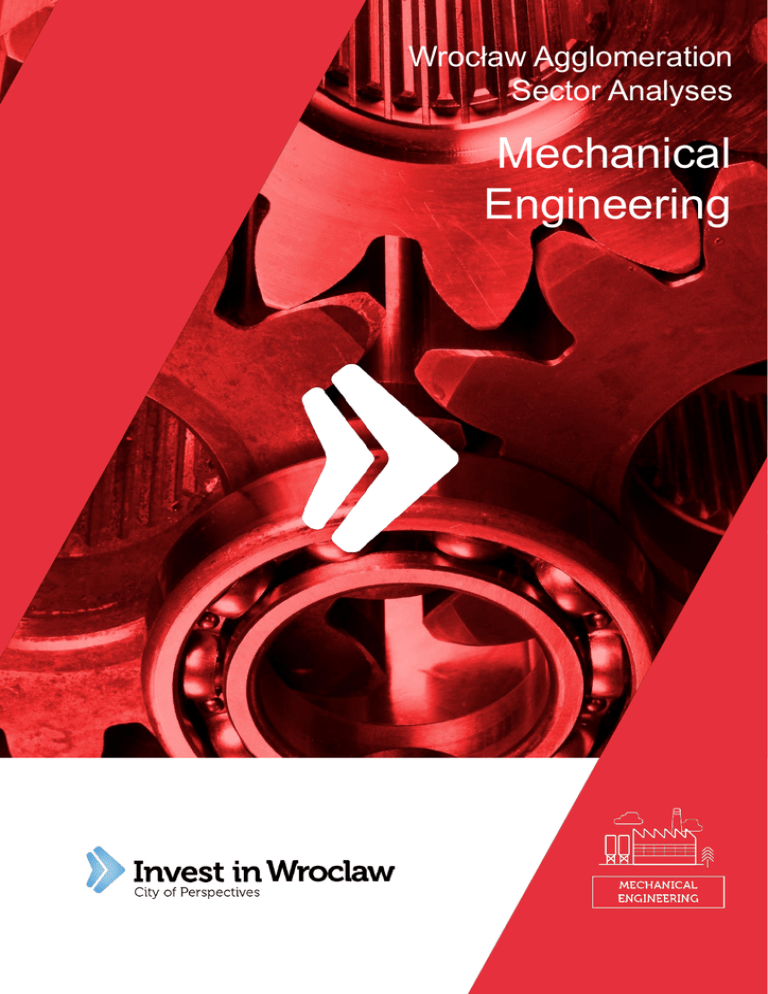
Wrocław Agglomeration Sector Analyses Mechanical Engineering CONTENTS 01 Mechanical engineering in Poland 02 Lower Silesia and the Wrocław Agglomeration as a Location for Investment 03 04 05 Development Prospects Investment Incentives The Regional Labour Market Case study – Bombardier Transportation 06 Case study – Alstom 07 The publication prepared in cooperation: 2 Introduction Wrocław is a unique and dynamic city, making an excellent place for investment and business development. The Wrocław Agglomeration's assets have not only been long appreciated by foreign investors, but they also have become a foundation for growth and global expansion of many well known Polish companies. However, the contemporary dynamics of change results in emergence of new needs, making information an increasingly valuable business resource. Both foreign conglomerates and domestic businesses seek useful information, indispensable in successful investment related decision-making. New economic conditions require undertaking non-standard action, which led to originating the Invest in Wrocław project (www.invest-in-wroclaw.pl). Many risk factors can be avoided, if one has a better understanding of sector-specific determinants and the development prospects of their own line of business as well as related industries. This was the rationale behind studies of the Wrocław Agglomeration's priority, strongly developing sectors, including the following ones: Automotive industry, Electronics, Chemical and Pharmaceutical industry, Mechanical engineering, IT, BPO, Food industry. We hope that the free of charge sector analyses will facilitate decision-making not only for potential investors, but also the companies already operating in the area of the Wrocław Agglomeration. Integration of information from different sources is supposed to contribute to establishing co-operation between suppliers, subcontractors and recipients from diverse lines of business related to sectors which are priority for Wrocław's development. Due to improving market transparency and increased ease of contact with businesses, the resulting benefits may be also enjoyed by local administration units, and most notably local communities. By combining all of the elements mentioned, it becomes possible for the whole Wrocław Agglomeration region to increase its growth dynamics and attain a competitive advantage. We hope that in this way we are redefining the standards of support for business development. 3 Chapter 1I Wrocław Agglomeration Sector Analyses – Mechanical Engineering Mechanical engineering in Poland The degree of growth of the machine engineering sector is a yardstick of the whole country's level of development as, apart from the fact that devices manufactured are exported, its products are widely applied in other industries. Consequently, the condition of the mechanical engineering sector and its technological advancement impact the development of other industries, and therefore - the entire country's growth. Since 2003, Poland has seen rapid development of the mechanical engineering sector, with annual growth levels of 10%. The situation significantly deteriorated with the advent of the global economic downturn, which brought about a drop in the industry's turnover in Poland. After the period of recession, the value of production sold fell to 22.3 billion PLN in 2009. Forecasts for the coming years, however, assumed a gradual recovery and further development of the sector. The expectations were reflected by the statistical data for the subsequent years, according to which the value of the industry's production sold amounted already to 23.9 billion in 2010 , to reach as much as 29.4 billion the following year. The positive, rising trend was maintained also in 2012, whose result was the increase of production sold by about 11% up to the level of 32.7 billion. Thus, the actual growth of the mechanical engineering sector in the years 2009-2013 exceeded the previous forecast. Detailed information with regard to the Polish mechanical engineering sector's sold production throughout 2011-2013 is provided in table 1. 01. Sold production in the Polish mechanical enigeering industry 2011 -2013 (M PLN) Value of production sold of the most important manufacture in millions of PLN 2011 Share % 2012 Share % 2013 Share % Machines for agriculture and forestry 4 066 13,8 4 741 14,5 4 713 14,2 Machines for mining and construction industry 3 773 12,8 4 526 13,9 3 689 11,1 Engines and turbines, excluding aircraft, car and motorcycle engines 3 452 11,7 3 602 11,0 3 951 11,9 Industrial cooling and ventilation devices 3 128 10,6 3 225 9,90 3 502 10,6 Bearings, gears, rack-and-pinion transmissions, power transmission components 3 040 10,3 3 159 9,70 2 938 8,9 Mechanical engineering industry – total 29 400 - 32 700 - 33 148 - Source: Own work based on: Central Statistical Office (GUS) Industrial goods manufacture in 2013 4 Chapter 2I Wrocław Agglomeration Sector Analyses – Mechanical Engineering Lower Silesia and the Wrocław Agglomeration as a Location for Investment The Wrocław Agglomeration and Lower Silesia have a well established reputation as a region attractive to investment in the mechanical engineering sector. The region's rich tradition stems from facts including the operation of industrial facilities such as Wrozamet and Pafawag, which satisfied part of the domestic demand and played a key role in the Polish industry. Currently, the sector is enjoying a period of dynamic growth through both expansion of the existing entities and new investments. Lower Silesia's attractiveness, investment-wise, is a result of factors including the region's good transport links, availability of well qualified engineers and the activity of numerous scientific-research units, with the Mechanical Faculty of Wrocław University of technology at the forefront. The trend is expressed by the fact that new facilities are being located and existing enterprises are being acquired by companies including ABB, Alstom, KGHM Zanam, Sauer-Danfoss, Haco, or Bombardier. An important part of the sector in the region of Lower Silesia are companies producing machines and devices for mining industries such as KGHM Zanam, Mine Masters, Boyart Longyear, and Ruda Trading. Apart from the features indicated above, the reagion’s attractiveness also stems from the fact that mining and copper processing (Legnica-Głogów Copper District) is well developed in Lower Silesia, while in the area of Wałbrzych there are remnants of the industry in the historic rock and brown coal basin. 02. Revenue of chosen enterprises from mechanical engineering sector active in Lower Silesia 2500 2000 1500 1000 500 0 Source: Dunn and Bradstreet 2013. (* includes revenue from sales of products manufactured across the whole country) 5 Chapter 2I Wrocław Agglomeration Sector Analyses – Mechanical Engineering Lower Silesia and the Wrocław Agglomeration as a Location for Investment To the most important subsegments of the mechanical engineering industry machines, engines and turbines industrial machinery - refrigerating appliances and ventilation systems Bearings, gears, drive elements. 03. Breakdown of selected enterprises involved in the machine engineering sector Company Production sector Location Country of origin Staff employed ABB Switchgear devices and electrical power engineering systems Wrocław Switzerland 3000 KGHM ZANAM Mining machines Polkowice Poland 2400 ALSTOM POWER Generators and stators for turbine sets Wrocław France 2200 GE Power Controls Polska Controllers, sensors and switches Kłodzko USA 650 Legrand Polska. Control, safety and measurement devices, transformers Ząbkowice Śląskie France 550 BOMBARDIER TRANSPORTATION Polska Traction systems, railway engines, carriages, trams and metro trains Wrocław Canada 550 HS WROCŁAW. Hydraulic systems for aviation Wrocław USA 550 PAFAL Measurement devices for gas and electrical current Świdnica Poland 370 SAUER-DANFOSS Steering systems and hydraulic engines Wrocław, Bielany Wrocławskie USA, Denmark, Germany 350 PRZEDSIĘBIORSTWO HAK Cranes and related devices Wrocław Poland 300 CHOFUM Casts for industrial machines Chocianów Poland 260 Dolnośląska Fabryka Maszyn Elektrycznych Machines and generators Wrocław Poland 190 MINE MASTER Mining machines Złotoryja Poland 180 RUDA TRADING Mining machines Polkowice Poland 150 DOLFAMEX Cutting tools Jelenia Góra Poland 150 INSS POL Steel structures and installations Wrocław Poland 120 ECKERT AUTOMATYKA SPAWALNICZA Cut-off machines for contour cutting Legnica Poland 100 MAGROTEX Helical conveyors Chojnów Poland 100 ENITRA Chains and conveyor belts Wałbrzych Poland 80 HURAS Konstrukcja i Budowa Maszyn Specjalnych. Pallet coilers and decoilers Legnica Poland 30 Source: Statistic Office, EMIS Intelligence, Bisnode 6 Chapter 2I Wrocław Agglomeration Sector Analyses – Mechanical Engineering Lower Silesia and the Wrocław Agglomeration as a Location for Investment Territorial distribution of mechanical engineering companies in Lower Silesia is shown in figure 4. The sector's companies are concentrated mainly in the area of Wrocław - the region's biggest economic centre, as well as in other big cities, which stems from the need to ensure an adequate quality of human resources, most notably engineers and production workers, indispensable in large scale manufacturing operation. A significant part of the sector's companies are based also in the area of Legnica and Głogów, and other cities belonging to the Legnica-Głogów Copper District, which is related to the region's copper and other metal deposits, as well as the well-developed mining, smelting and power engineering industries. Due to global economic links, employees' command of foreign languages is an important factor for mechanical engineering companies. Additionally, as far as more advanced manufacture is concerned, other factors of investment attractiveness become important, including the region's level of economic development or a welldeveloped social infrastructure. This is why Wrocław is continually enriching its cultural offering, testimony to which is, for example, the city's title of the European Capital of Culture for 2016, as well as its hosting the World Games in 2017. 04. Geographic distribution of mechanical engineering sector companies Source: Invest In Wrocław 7 Chapter 3I Wrocław Agglomeration Sector Analyses – Mechanical Engineering Development Prospects Poland is an attractive location for the sector's companies, with proof being the numerous investments carried out so far by most of the global leaders including ABB, Alstom or Bombardier Transportation. The good conditions for doing business in Poland and prospects for further growth are reflected by the fact that investors are developing their operations and increasing their production capacity, as well as launching more innovative products such as Bombardier's bogie frames for high speed trains. The most significant advantages in terms of investment in the mechanical engineering sector in Poland, particularly in the area of Wrocław, are following: Poland's and Wrocław's favourable location at the intersection of main trade and transport routes, access to the uniform EU market, stable economic and political situation in Poland, large human resources potential - around 11.4 million Poles are below 25 years of age, exceptionally large number of university and college students - over 2 million people (130,000 in Wrocław) are studying at 470 higher education institutions in Poland, which amounts to as many as 11% of the EU's total number of students, highly qualified human resources – approximately 150,000 staff are employed in the Polish mechanical engineering sector, rich tradition of the machine industry in Wrocław, well developed mining and copper processing in the Legnica-Głogów Copper District, area of the access to well qualified staff with engineering background in the area of Wrocław, exceptionally strong research and development base involving the operation of numerous R&D units, particularly the Mechanical Faculty of Wrocław University of Technology, one of Poland's best scientific units of this kind (the highest, 1 grade, granted by the Ministry of Science and Higher Education), potential employees' very good command of foreign languages; over 90% of university students know foreign languages (impressively, Poland was ranked10th among 54 countries in the study conducted by Education First), competitive labour costs combined with high quality workforce, support system within the framework of government policy favouring investment; investment incentives for sector's projects. the It is worth pointing out that the region of Wrocław has an immense human resources potential, which may be tapped by companies operating in the mechanical engineering sector. Lower Silesia offers an adequate number of engineers and production workers, which facilitates not only manufacture of advanced products, but also development of an R&D base. A particularly significant role is played in this respect by Wrocław University of Technology, which - as one of the country's leading higher education institutions - is more and more closely collaborating with companies from the mechanical engineering sector, most notably KGHM. Another fact of a major importance to the sector's development is that throughout the years 2009-2013, the university carried out the project entitled "Increase in the Number of Wrocław University of Technology Graduates of Majors of Key Importance to the Knowledge-Based Economy", which involved 9 majors commissioned by the Ministry of Science and Higher Education. These included automatics and robotics, mechatronics, or mechanical engineering and machine construction. The project also entailed students’ scholarships at renowned foreign universities (Germany, the USA), thanks to which they could become familiar with production facilities of manufacturers including Porsche and Mercedes. 8 Chapter 4I Wrocław Agglomeration Sector Analyses – Mechanical Engineering Investment Incentives Investors from mechanical engineering sector who consider conducting their business projects in Poland are eligible to apply for public assistance. The most important investment incentives in the form of public assistance include the following: Income tax exemption in Special Economic Zones, Government subsidies for investments of a considerable importance to the economy, Property tax exemption, granted on the basis of particular local governments resolutions, Subsidies from the EU structural funds. Investors from mechanical engineering sector have an opportunity to execute a new strategic investment project with use of direct subsidies from the state budget, within the framework of the so-called "Long-term Support Programs„*. The assistance is offered on the basis of the volume of newly created workplaces and the total value of investment outlay. The maximum volume of incentive that an investment project is eligible to receive is determined by the assistance intensity defined on the map of regional support. The maximum volume of regional support is, in turn, expressed as a percentage of the qualified costs (i.e. project costs). The total amount of incentive granted cannot exceed the value of qualified costs multiplied by the regional intensity index, which for Wrocław and Lower Silesia in the period of 2014 – 2020 accounts for 25%. 05. Available sources of public assistance* Support program for investments of a major significance to the Polish economy over the years 2011-2020 Subsidies EU funds Income tax (CIT or PIT) exemption of income generated by business operation within a Special Economic Zone Tax exemptions Property tax exemptions Subsidies for research and development Subsidies for training Grants and subsidies with regard to newly created workplaces Other investment incentives Subsidies and preferential loans from domestic sources for projects related to environmental protection (waste management, energy efficiency) Tax incentives for research and development operation Preferential loans for purchase or implementation of innovative technologies - the so-called technological loan *Detailed criteria and requirements for potential investors are defined within individual forms of public aid 9 Chapter 5 I Wrocław Agglomeration Sector Analyses – Mechanical Engineering The Regional Labour Market Wrocław's labour market is one of the fastest developing and most stable Polish regional markets. It is determined, on the one hand, by the availability of human resources, including highly qualified engineers, and low labour costs given employees' standard of qualifications, on the other hand - by the diversity of economy sectors present, with the mechanical engineering industry high-ranking in importance. In the third quarter of 2014, the unemployment rate in the Lower Silesian Voivodship amounted to 8.3%, with Wrocław seeing the rate of 4.8%. There were slightly over 1.77 million professionally active people, accounting for 40% of the entire population of Wrocław. The increase in the number of employed people, as against the previous year, reached 20 thousand. . Mechanical engineering Mechanical engineering is one of Poland's best developed industry sectors. It plays a major role in shaping the Polish economy, with 32.7 billion PLN worth of business as of 2012. Manufacturers of machinery and devices provide 4.4% of workplaces in the Polish industry. The average employment volume in the sector of enterprises manufacturing machinery and devices amounted to 127 thousand people. As of the end of 2012, the value of foreign direct investors' revenue gained from the capital invested in Poland reached over 3.4 billion PLN. 06. Manufacture of machinery and devices in 2012 roku Manufacture of machinery and devices in 2012 Staff employed (in thousands) 127,0 Foreign direct investors' revenue gained from the capital invested in Poland in millions of PLN 3 411,6 Export in millions of PLN 17 722,1 Source: Central Statistical Office (GUS), The Statistical Yearbook of Industry 2013, National Bank of Poland data. In 2010, companies manufacturing machinery and devices employed about 137 thousand staff. For comparison, in the Czech Republic, the sector employs 15% staff less. In 2008, the initiative of the Wrocław area entrepreneurs producing machinery and devices, as well as those offering technological, distribution, consultancy and education services, and 2B2 services led to the establishment of the CINNOMATECH cluster. The cluster delivers services in the areas of manufacture, education, R&D, and consultancy. The cluster's important task is to support the region's economy and reinforce the competitiveness of enterprises operating in the production line of business. Its main goals are: to create a collaboration network, improve innovativeness of enterprises and manufacturers, as well as develop and launch innovative products and services. Education: Wrocław is ranked one of the biggest academic centres of Poland, next to Warsaw, Cracow and Poznań. In Wrocław alone, ca. 130 thousand people are studying at 24 higher education institutions. In terms of students' numbers, Wrocław is Poland's third largest academic city, following Warsaw and Cracow. It outstrips significant centres including Poznań, Łódź, Gdańsk or Lublin. In 2013, over 34 thousand graduates left the city's universities. The key higher education institution on the map of the city is Wrocław University of Technology (35 thousand students), providing education in areas such as mechanics and machine construction, automatics and robotics, or mechatronics. 10 Chapter 5I Wrocław Agglomeration Sector Analyses – Mechanical Engineering The Regional Labour Market Labour costs: Compared to other EU countries, labour costs in Poland are still some of the lowest. A Pole's average gross income accounts for as little as 1/5 of pay received by Danish people, the Union's best paid employees, 23% of Irish people's 136,7 pay, 1/3 of Britons' and Germans' income, and 40% of what Spanish employees earn. In March 2014, the average gross monthly salary in enterprises amounted to 4,017.8 PLN. In this period, the regions which saw the highest level of pay were the voivodships of Mazovia (5,107.2 PLN), Pomerania (4,159.5 PLN) and Silesia (4,073.7 PLN). The residents of the Lower Silesian voivodship employed in enterprises earn less than the domestic average, with average pay amounting to 3,841.4 PLN. Pay in the Polish mechanical engineering sector amounts to 3,778 PLN. In Wrocław, ordinary workers employed in the sector are paid an average 5,110 PLN; with specialists earning 5,530 PLN and managers - 10,010 PLN 08. Total monthly pay in Wrocław's mechanical engineering sector, in PLN Position First quartile Median Third quartile directors 17 160 20 550 24 600 managers 8 140 10 010 12 130 specialists 4 850 5 530 6 270 ordinary workers 4 490 5 110 5 760 Source: Pay reports by HRM partners 2013. 11 Chapter 6I Wrocław Agglomeration Sector Analyses – Mechanical Engineering Case study– Bombardier Transportation Bombardier Transportation is the biggest international investor operating in the Polish rail transport sector. It employs over 1200 staff in facilities in Wrocław, Katowice, Łódź and Warsaw. The company, part of the Canadian conglomerate Bombardier Inc., runs diverse operations including manufacture of running gears and passenger trains, bogie frames for high speed trains, regional traffic multiple units, trams and metro carriages, design and manufacture of rail traffic control systems, manufacture of electronic devices, maintenance of railway rolling stock, devices for rail traffic control systems. Bombardier Transportation products are well-known and highly rated across the entire country. In Poland, BOMBARDIER TWINDEXX double decker trains are used mainly in the region of Mazovia by the Mazovian Railways, while the TRAXX line engines are part of the rolling stocks of LOTOS Kolej, Pol-Miedź Trans and Mazovian Railways. Another product, the low-floor FLEXITY trams, facilitates city transport in Cracow, Gdańsk and Łódź, while traffic control systems designed and manufactured by Bombardier Transportation are applied in the majority of Polish main rail routes (soon, the state-of-the-art ERTMS technology Level 2, delivered by the Katowice facility, will operate at E65 WarszawaGdynia and E30 Legnica-Wrocław-Opole routes). Locomotives TRAXX. 12 Chapter 6 I Wrocław Agglomeration Sector Analyses – Mechanical Engineering Case study– Bombardier Transportation The Wrocław facility is a continuator of the tradition of Pafawag Carriage Production Plant. Production at the facility was launched as early as in the 30's of the 19th century, which makes it one of the oldest rolling stock production facilities in Europe and, at the same time, Poland's oldest facility of this kind still in operation. It is worth adding that the facility, operating till 1997 as the Wrocław National Rail Carriages Production Plant, in the 80's of the 20th century was one of the largest manufacturers of rolling stock in Europe, as well as Poland's biggest producer of electric engines, electric multiple units and railway carriages. The Wrocław based Bombardier's plant is one of the biggest Canadian investments in Poland. Currently, all TRAXX line engine bodies are manufactured at the Bombardier Transportation Wrocław facility, targeting the European and North American markets. Over recent years, TRAXX has become in Poland a synonym for highest quality and reliability of new generation railway engines. So far, over 2,000 TRAXX engines for passenger and cargo traffic have been sold. Within the framework of internal collaboration within the conglomerate, the Wrocław unit also manufactures subassemblies for other rail vehicles made by Bombardier (including bogie frames for high speed trains, regional traffic multiple units, trams and metro carriages). In July 2000, the company was granted the certificate of integrated management systems based on the PN-ISO 9001, PN-EN-ISO 14001 and PN-N-18001 standards. In 2001, it was awarded the "Polish Environmental Protection Pantheon" prize. New investments and modernisation works at the Wrocław facility followed in the subsequent years. In 2005, over 12 million PLN was spent on a modern, fully glassed paint shop, one of Europe's most modern facilities of this kind, catering for every kind of rolling stock: engines, trams and commuter trains. Since 2013, the Wrocław unit has been significantly developing its operation. A few new undertakings have been underway, in relation to the Bombardier conglomerate's fulfilment of big contracts involving, among others, manufacture of passenger train bodies for Hamburg's S-Bahn, manufacture of bodies for 450 electric engines and 200 diesel locomotives for Deutsche Bahn railways. 13 Chapter 7I Wrocław Agglomeration Sector Analyses – Mechanical Engineering Case study– Alstom For 20 years, Alstom company has been actively committed to the development of Polish economy. It employs over 3,200 staff in power engineering, transmission networks and transport. The Polish branch owns production facilities in a few cities, including the following: turbine production facility and casting houses in Elbląg, generator production facility and the European Alstom centre specialising in turbogenerator development in Wrocław, rolling stock production facility in Chorzów. The production and technological base enables local manufacture of all of the most important devices, as well as servicing in the Polish Alstom servicing centres. Since the beginning of its Polish operation, the conglomerate has focused on quick technological development, thanks to which Alstom is a leader on the Polish market, delivering turnkey projects for coal fuelled power stations, while serving as the Original Equipment Manufacturer of 95% of the power engineering base installed. Over 320 medium-sized and large steam and gas turbines installed in power stations worldwide were manufactured in Alstom Power's Polish production plants, mainly in Wrocław. Cast steel and cast iron foundries located in Elbląg supply casts to other Alstom facilities all over the world. Additionally, Alstom carries out numerous key projects in the area of power engineering infrastructure, whose execution also involves Polish companies. Over recent years, the enterprise has commissioned companies including Polimex, Rafako, Energomontaż Południe, Budimex or Remak to perform contract works. Almost 90% of the conglomerate's production output in the area of power engineering is exported. As far as the transport section is concerned, the volume is as high as 100%. The conglomerate's operation in Wrocław dates back to the year 2000, when the Alstom Power Genarators company, headquartered in the capital of Lower Silesia, was established. Already a year later, ALSTOM Power Generators Sp. z o.o. (Wrocław) and ALSTOM Power Sp. z o.o. (Elbląg) merged. As a result, ALSTOM Power Sp. z o.o. came into being - a company specializing in manufacture of power engineering infrastructure. Its headquarters are located in Warsaw, whereas the main branch and the production facility are in Wrocław. In the subsequent years, the Wrocław plant saw consistent increase in the manufacture of generators, whose range, including both devices for small power plants and very large ones - exceeding 400 tons in weight, kept broadening. Generators from the Wrocław facility began reaching global buyers, located in countries such as Egypt, Saudi Arabia, the USA or China. Moreover, a European Alstom centre specialising in development of turbogenerators was launched in the city. For many years now, the facility has delivered generators applied in Alstom's biggest global projects, e.g. development of a nuclear power plant in Sweden, modernisation of the Turów power plant, as well as construction of the new blocks at the Bełchatów and Opole power plants. 2000 Establishing of ALSTOM Power Generators in Wrocławiu 2001 Merger of ALSTOM Power Generators Sp. z o.o. and Power Sp. z o.o. 2005 Finishing the contract for modernisation of PGE Turów plant 2008 Delivery of a turnkey project entailing an engine room and cooling stack for Patnow II and Łagisza plant 2011 Commissioning of new block for Bełchatów plant 2014 Signing a contract for carbon blocks construction in Opole II plant 14 Chapter 7I Wrocław Agglomeration Sector Analyses – Mechanical Engineering Case study– Alstom 2000 Foundation of the ALSTOM Power Sp. z o.o. company (headquartered in Elbląg) 2000 Foundation of the ALSTOM Power Generators Sp. z o.o. company (headquartered in Wrocław) 2001 Merger of ALSTOM Power Generators Sp. z o.o. (Wrocław) and ALSTOM Power Sp. z o.o. (Elbląg). Since the merger, the company has operated as ALSTOM Power Sp. z o.o., with headquarters in Warsaw and a branch in Wrocław 1995 – 2005 Alstom Power's turnkey modernisation of blocks 1-6 of the PGE Turów power plant 1997 – 2010 Alstom Transport's delivery of trams for a few Polish cities and metro carriages for the Warsaw metro 2000 – 2008 Delivery of a turnkey project entailing an engine room for the Pątnów II power plant 2005 – 2009 Alstom Power's turnkey project entailing an engine room together with a cooling stack for the PKE Łagisza power plant 2010 Establishment of a new branch - ALSTOM Power Sp. z o.o. in Katowice (Alstom Grid) 2011 In September, Alstom handed over a new 858 MW block at the Bełchatów power plant - the largest power generation block in the history of Polish power engineering 2011 Contract for delivery of 20 high speed Pendolino trains for PKP Intercity, along with development of the servicing base and the manufacturer's 17 years’ after-sales service in Poland. 2013 Foundation of the ALSTOM Renewable Poland Sp. z o.o. company (headquartered in Elbląg) 2014 Contract for construction of coal blocks at Opole II Power Plant, worth approximately 1.25 billion EUR. Alstom, as the main contractor, will deliver devices including generators, steam turbines and boilers. Alstom's seven design offices are involved in the construction of blocks 5 and 6; the conglomerate is also managing the entire project. According to the schedule, the handing over of block 5 is planned for 2018, while the start-up of block 6 will take place in 2019. The undertaking is Poland's and EU's biggest infrastructure investment. 15 Author of the study: within the framework of „Mozart” 2013/2014 - the Municipal Program of Support for the Partnership of Higher Education, conducted as Partnership: The Invest in Wrocław team comprises professionals hailing from the Agency of Wrocław Agglomeration Development and JP Weber. The experts, boasting extensive knowledge of the region, investment locations, conditions of investing and doing business in Poland, will effectively support investment projects and provide all necessary information. You are welcome to visit the portal www.invest-in-wroclaw.pl For over 12 years, JP Weber has been supporting international investors in their Poland based investment-related operations and their day-to-day tax and accounts related, as well as legal dealings. We employ over 60 investment and tax advisers, as well as lawyers operating from our Wrocław and Warsaw offices. We provide services to both large global conglomerates and SMB sector enterprises planning their business activity in Poland and we support Polish companies in looking for strategic investors and in their international expansion. We support decision-makers in transactions and day-to-day handling of their businesses, guaranteeing an individual client-oriented as well as comprehensive approach to the Polish market's business. You are welcome to visit our website www.jpweber.com When planning to start business operation in the area of the Wrocław agglomeration, every company is eligible to receive support from the Agency of Wrocław Agglomeration Development, responsible for supporting foreign investment activity. Already since 2005, the Agency has been providing assistance to foreign investors in the area of planning and conducting comprehensive investment processes, also by ensuring post-investment care. The dedicated team of specialists supports investors at every stage, making sure that the whole investment process is carried through fast and effectively. You are welcome to visit www.araw.pl HRK is one of the largest human resources management consultancy organisations operating in Poland. We offer comprehensive services for investors in the area of human resources management by supporting them in their recruitment projects, as well as in professional potential research and development, career path building and employer branding. Under the brand of HRK Payroll Consulting, we deliver services with regard to payroll administration and personnel documentation management. As part of IRC Executive Search and Bernard Hodes Global Networks international networks of globally active employer branding experts, we deliver projects across the whole country and abroad. You are welcome to visit our website www.hrk.eu. Jarosław Ignacy, Ph.D. Doctor of economic sciences, specialising in strategic management and lecturer at the Department of Strategic Management of Wrocław's University of Economics. He has combined his academic activity with collaboration with business as an adviser and consultant for many years, having authored numerous strategies, studies and expert opinions for the needs of companies, institutions and local government units. Participant and expert member of many research projects in Poland and countries of the European Union, linked to various aspects of entrepreneurship, strategic management and New Public Management. 16 The following sources of information were used for the purposes of the study: 1) Statistical data and sector studies of the Central Statistical Office (GUS). 2) Data, analyses and sector presentations of PAIiIZ (Polish Information and Foreign Investment Agency). 3) Data and information of the Wrocław Agglomeration Development Agency. 4) Data of EMIS Intelligence. 5) Analyses, forecasts and information from the Ministry of Economy. 6) Information from the websites of Bombardier and Alstom companies. 7) Generally available press information (including Bankier, Forsal, Gazeta Prawna, Puls Biznesu, Gazeta.pl, and Money.pl) with regard to the development of Bombardier and Alstom companies. 8) "Wrocław Driven by Knowledge" publication – the Wrocław Agglomeration Development Agency/Knight Frank. 9) Publications of the Organisation of Economic Co-operation and Development and the World Bank. 17 Contact: Agencja Rozwoju Aglomeracji Wrocławskiej SA pl. Solny 14 50-062 Wrocław Tel. +48 71 78 35 310 Fax +48 71 78 35 311 email: araw@araw.pl JP Weber sp. z o.o. ul. Rynek 39/40 50-102 Wrocław Tel. +48 71 36 99 630 Fax +48 71 36 99 639 email: info@jpweber.com
